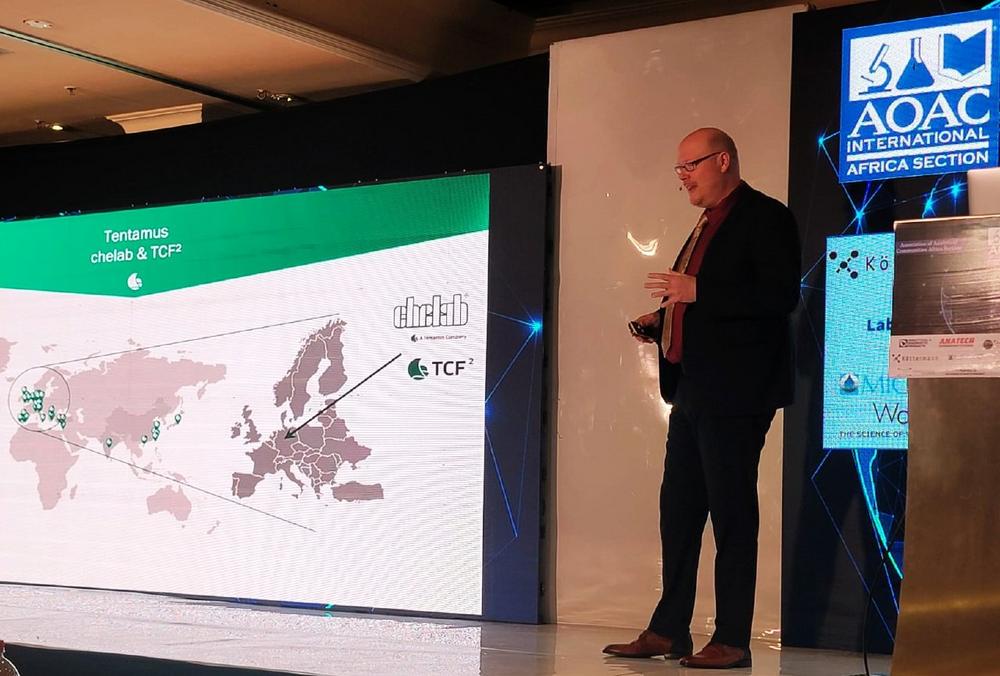
Tentamus at the AOAC conference in New Orleans
Per- and polyfluoroalkyl substances (PFAS) are manmade, ubiquitous “forever chemicals” that slowly made their way back into our food in the last decades via the air- and water cycles. PFAS are widely used in industry because of their thermal stability, hydrophobicity, and relative inertness but may cause harmful health effects. PFAS regulations for food are not well defined at this stage. As there are more than 14,000* PFAS compounds out there, finding a common approach for analysis is a huge challenge. Furthermore, not all substances can be analyzed with the same method. Additionally, as the required limits of detection are very low, background contamination needs to be properly addressed to prevent false positives.
“PFAS are indeed a very hot topic not only in the US but also in the EU. A lot has happened in terms of method development and also maximum limits and in this session we will get highly valuable insights from the experts.”, explains the session chair, Arne Duebecke, enthusiastically.
Several experts from different organizations will join the panel.
Dr. David Gratson, Associate of Environmental Standards Inc., will provide the background that enables the audience to dive deeper into the topic of PFAS, the so-called forever chemicals.
The view of the authorities will be addressed by Dr. Susan Genualdi. She is a research chemist with US-FDA and currently also chair of the AOAC INTERNATIONAL Working Group on the development of Standard Method Performance Requirements (SMPRs®) for Per- and Polyfluoroalkyl Substances (PFAS) in produce, beverages, dairy products, eggs, seafood, meat products, and feed.
How are PFAS analyzed? Dr. Limian Zhao, application scientist at Agilent Technologies Inc., will shed light on the analytical options, the challenges analytical scientists are facing as well as limits of instrumental analysis of PFAS.
So now the background, the official requirements and the analytical options are covered. But how is all of that efficiently translated into a commercial lab environment? Dr. Dan Safarpour, CEO of Symbiotic Research, LLC (member of Tentamus) will share his experience on that challenge.
How strong is the food and ingredients industry actually affected by PFAS? The PFAS-related challenges that industry is facing will be covered by Dr. Stefano Liparoto, Global Regulatory and Sustainability Director at Vantage Specialty Chemicals, who will finalize the session with his perspective.
The co-chair, Dr. Lorna De Leoz, Global Food Segment Manager at Agilent, is also looking forward to the event and states: “I am very happy that we will have such esteemed guests join our PFAS in Food session to share their knowledge and experience on PFAS in the wonderful city of New Orleans.”
See you in New Orleans!
You want to learn more about how Tentamus can support you on PFAS? Please do not hesitate to contact us.
Tentamus Group GmbH
An der Industriebahn 26
13088 Berlin
Telefon: +49 (30) 206038-230
Telefax: +49 (30) 206038-190
http://www.tentamus.com
Head of the Tentamus Center for Food Fraud (TCF²)
Telefon: +49 (174) 16712-23
E-Mail: arne.duebecke@tentamus.com
Telefon: +49 (30) 206038403
E-Mail: sara.pinto@tentamus.com
![]()




